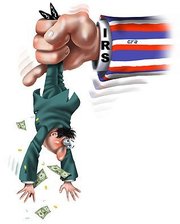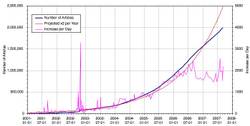Think of this as Volume 11, Number 10 of A-Clue.com, the online newsletter I’ve written since 1997. Enjoy.
Right now the U.S. economy, and the U.S. in general, is in a vicious cycle. (Picture from DC Fred
.)
Wealth is decreasing, so sales are slowing. Sales are slowing, so the economy is tanking. The economy is tanking, so the dollar is tanking. The dollar is tanking, so we’re importing inflation. Prices are rising so we can’t cut interest rates. High interest rates causes wealth to decrease…lather, rinse, repeat.
What if we could replace this vicious cycle with a virtuous one, as we had in the 1990s?
We can, but it can’t be the same. Back then we were building the Internet. That’s built. We could improve it, add lanes, add competition, and that would be a very good thing indeed, but it won’t provide the kind of virtuous cycle we got back in the day. Sorry.
But we can get that virtuous cycle if we commit to a War Against Oil.
What does a War Against Oil mean? It means a total commitment, on the order of a real war (not the kind we’ve been fighting in Iraq) to eliminating the use of hydrocarbons in our lives. That’s the clearly defined victory, and (as the current President likes to remind us) nothing less than victory will do.
How do we do it?
- Stop trying to keep the price of oil low. Let it go up.
- Lock in the gains with a floor price so producers can’t cut production to regain their market share.
- Switch all tax incentives from oil and gas production to
production of alternatives like wind, geothermal, solar, and the
conversion of excess to hydrogen. Add in incentives for investments
which cut energy use, hybrids, insulation, etc. etc. etc. - Have electric utilities build intelligence into their networks so
they can buy electricity from homes and businesses as well as sell it.
- Be vigilant about rip-offs, and treat thieves as war profiteers.
- Lather, rinse, repeat.
There’s as much jaw-jaw to this war-war as anything else. You want the media to
focus as intently on alternative energy and energy-saving as it
presently does on the minutiae of Presidential campaigns. Dropping the
energy cost of producing goods and services is as vital as creating
alternative energy — it’s just as valuable.
So how does this create a virtuous cycle?
- We’re cutting imports when we produce energy from homegrown wind, water and sunlight.
- We’re creating technology for export. Lots of technology.
- The power of our adversaries in the world — Russia, the Arabs,
Al Qaeda, Venezuela, Nigerian pirates — goes down. The power of our
friends — Japan, Europe, those who build technology — goes up.
- We’re creating skilled, but dirty jobs, cutting unemployment
especially among those with less education, perhaps even recycling the
1% of us in prisons. - As the use of hydrogen increases, we’re producing energy
precisely where we need water most, and water is the pollution of a
fuel cell. - As we rebuild our energy infrastructure, we’re also rebuilding our infrastructure generally.
- Did I tell you this is a war everyone can win? China can win this
war. Japan can. Europe can. Even the developed world is better off with
cheap energy abundance than expensive energy imports.
- Reduce the carbon footprint to zero and we can save the planet. Or at least Florida.
- Lather, rinse, repeat.
(The picture actually shows the Wikipedia article count, but the idea is the same.)
Just as busts have causes, namely excess, so do booms, namely
opportunity. This is the greatest business opportunity of our time, and
we can make it better simply by changing the incentives and remaining
vigilant against rip-offs.
That takes political will. That’s what I’m asking of you now.
Critics will say we’re engineering the economy, that we’re picking
winners and losers. So what. We’ve been doing that since, like,
forever. Government policies always direct the "free" market, whether
those are tax policies, regulatory policies, or the mere rhetorical
preferences of our leaders. Some of our biggest booms were
government-funded — the PC boom by the Space Race, the suburban boom
by the Interstates, the Internet boom by the Cold War.
As I’ve said many times, this is a long-term plan. This is what we’ll
have to be doing for the rest of our lives — yours, mine, and those of
our children. It took us generations to get into the mess we’re now in,
and it will take generations to climb out of it.
Back in the late 1970s we faced this same choice and we took the wrong
road. We, the People decided we could kill our way out of trouble. We
can’t. It is, in the end, a self-defeating process, as we’re now seeing.
Let’s replace the vicious cycle of 2000 with the virtuous cycle of 21st century survival.
Let’s fight The War Against Oil now.













The economy was fairly blah in Clinton’s first term, when we were building the Internet. It wasn’t until it was largely built that we really saw gains. I think it is consistent with history. The gains from large public projects are always biased more to the long term than the short. I don’t really disagree with your plan. All the points have merit and it would certainly work in the long term. However, there is an easy short term fix for the economy — leave Iraq. Our creditors see our occupation as an unsustainable drain on our economy, a bad investment. What’s worse, they don’t even agree with our cause of liberation and democracy or don’t believe that is what we are doing. In effect, we sold the cow for some magic beans. Is it any surprise that we are being sent to bed without our dinner? What the Neo-Cons failed to realize is that all the outsourcing and Walmartization they allowed to set up their crypto-feudalist regime has made the economy very vulnerable to foreign manipulation. The very thing everyone was afraid of in the 80s has come to pass. Only it turns out that rather than being our overlords, the Japanese fell into exactly the same trap as us and now we must both kowtow to those we had so recently looked upon as new markets to exploit.
The economy was fairly blah in Clinton’s first term, when we were building the Internet. It wasn’t until it was largely built that we really saw gains. I think it is consistent with history. The gains from large public projects are always biased more to the long term than the short. I don’t really disagree with your plan. All the points have merit and it would certainly work in the long term. However, there is an easy short term fix for the economy — leave Iraq. Our creditors see our occupation as an unsustainable drain on our economy, a bad investment. What’s worse, they don’t even agree with our cause of liberation and democracy or don’t believe that is what we are doing. In effect, we sold the cow for some magic beans. Is it any surprise that we are being sent to bed without our dinner? What the Neo-Cons failed to realize is that all the outsourcing and Walmartization they allowed to set up their crypto-feudalist regime has made the economy very vulnerable to foreign manipulation. The very thing everyone was afraid of in the 80s has come to pass. Only it turns out that rather than being our overlords, the Japanese fell into exactly the same trap as us and now we must both kowtow to those we had so recently looked upon as new markets to exploit.